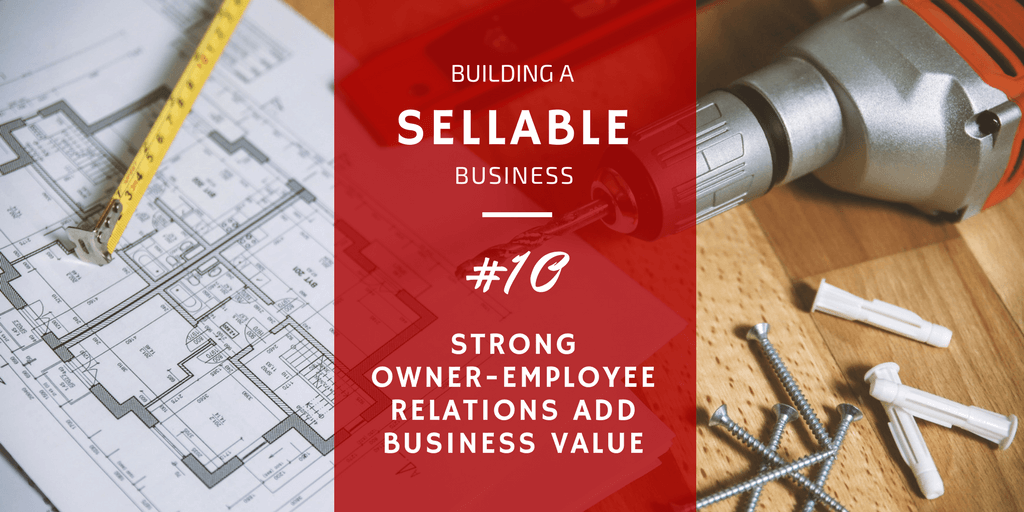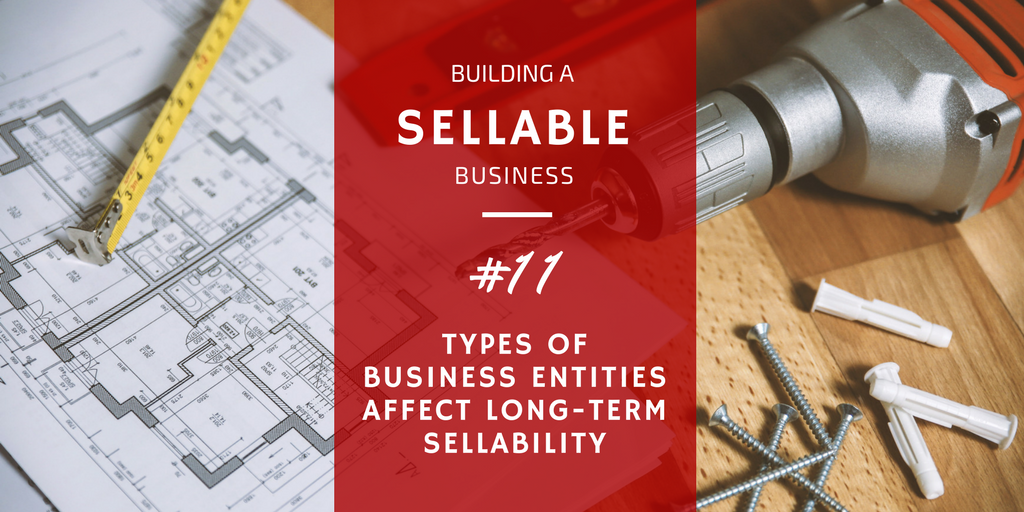
Strong Owner-Employee Relations Add Value at the Sale of Your Business – Post #10
December 7, 2017
Clear Financial Reports Entice Business Buyers – Post #12
December 21, 2017Types of Business Entities Affect Long-Term Sellability – Post #11

In today’s article, we’re going to discuss how choosing the right type of business entity at a company’s creation can affect its liability and its sellability. Many people believe that business exit planning, the idea of preparing a business to sell, occurs around the time the sale takes place. Perhaps, owners think they can begin preparing their company for sale one or two months beforehand. Based on my experience, that couldn’t be further from the truth. Some of the planning we business owners need to do should be done five to ten years before the sale ever occurs.
Podcast Time Index for “What Type of Business Entity Should I Choose?”
00:34 – What type of Entity should I choose?
00:57 – When planning to sell, being the right Entity matters
04:06 – The 4 basic types of Entities
05:04 – Advantages & Disadvantages of each type
06:40 – Transference of Stock
07:30 – Flexibility
08:50 – Tax Benefits
09:25 – Documentation
13:20 – Have an awesome Team
14:55 – Summary
A few years ago, one of our clients we’ll call her “Sally”, ran into an interesting business dilemma directly relating to the type of business entity she chose. Sally was a successful businesswoman who worked hard and built an amazing company. One day, completely out of the blue, a buyer stopped in and made Sally an unbelievable offer to buy her business. This was a once-in-a-lifetime, dream offer. After she received a written offer, she contacted our office to help her prepare for her business’s sale.
Scrambling, we assembled an exit team. Our team stepped into the role of a CERTIFIED FINANCIAL PLANNER™. We added in an attorney and a Certified Public Accountant. When we began reviewing the buyer’s offer and the business owner’s financial statements, the team quickly recognized a snag. The problem actually revolved around the type of business entity Sally had formed. As her business was currently structured, Sally’s business would pay taxes upon the sale. Then, she would pay taxes on the remainder of the proceeds on a personal level. It’s called double taxation. And it seemed like highway robbery to Sally.
Obviously, Sally didn’t sell the business at that time. Instead, we put together a long-term business plan. Her current goal is to sell her business in ten years with fewer tax ramifications.
4 Basic Types of Business Entities
So if you’re starting up a business now, or if you’re already in business, choosing the right type of business entity matters a great deal. I’ll provide you with a list of the types of business entities you can create. To know which entity is best for your company, though, you’ll want to consult your own professional team that includes a good attorney, a seasoned CFP®, and a strong CPA. Here are the four basic types of business entities:
- C Corporations
- S Corporations, a.k.a. Sub-Chapter S Corporations
- Partnerships
- Limited Liability Companies, a.k.a. LLCs
There’s actually a fifth type of business, but it’s not an official business entity, so I didn’t include it in my list. If you don’t form your company as a C Corp, an S Corp, a Partnership, or an LLC, then you’re operating a sole proprietorship by default. While it’s a business, it’s not a type of business entity.
Why Choose One Type Of Business Entity Over Another
Each type of business entity has advantages and disadvantages. Ultimately, business owners choose to operate as an entity for one, or several, of the following reasons:
- Personal Liability Protection – Operating your business under a corporate veil will protect your personal assets should your business run into problems. Additionally, running a company as an entity can reduce personal exposure to risk and act as a hedge of protection over and above what business insurance can provide.
- Transference of Stock or Membership Interest – Within C Corps or S Corps, you can divide stock, move stock or transfer stock among owners or investors with some limitations. You can even give certain types of stock to employees. In an LLC, members (the owners) can re-arrange, divide, re-allocate, or transfer membership interests.
- Flexibility – Vital to entrepreneurs, business entities allow owners to manage their companies as they see fit. They have flexibility over the ownership structure that allows the company to move and flow as individual owners’ circumstances do.
- Tax Reduction Strategies – With the help of a professional CPA, business owners can take advantage of tax-free fringe benefits available to business entities. They can also prevent double taxation issues or plan how much they’ll pay in taxes by operating as an entity and by getting help from an accountant.
Remember my client Sally? Had she filed one document, she could have moved her company from a double taxation system into a single taxation system pretty easily. With just one form, folks. So, the type of entity you choose is important. Just be sure to seek the help of your attorney, your tax preparer, and your financial planner.
FREE DOWNLOADABLE: Business Entities Pros & Cons Cheat Sheet
Documents Business Entities Should Have
Let’s say you’ve talked to your team of professionals. With everyone’s help, you’ve decided that you’re operating under the right type of business entity. Well, you’re not off the hook yet. No. You’ll need some documents for added personal and business protection. Here’s where a good attorney can help you.
A popular document within partnerships and corporations with multiple owners is a Partnership Agreement or an Operating Agreement. This document addresses how your company will deal with owner disagreements. It specifies who will fill which role and how the company will be managed. Additionally, it outlines how and where the company will handle lawsuits. Written with vast detail or in relatively simple terms, the agreement protects business owners should a crisis ensue.
Additionally, many lawyers will recommend that their business owner clients draw up a Buy-Sell Agreement. Whether you have multiple owners or majority and minority shareholders, you’re all working toward the eventual sale of the company. With this type of document, you can dictate how the company will be sold, for what minimum price it will sell, and under what arrangement it will sell. This agreement can also address what happens to the company in the event of an owner’s death or disability. While not required by law, if you’re building a company to sell it, the very title of the Buy-Sell Agreement seems to recommend its use.
When To Make New Records
Even though you and your team of professionals have drawn up the business creation documents your particular company may need, you’re still not done with your business entity selection. Now, you have to maintain your business entity. You’ll need to document, document, document! Accurately recording business transactions and keeping up with those records can spare you heartache and loss if you end up running into legal battles in the future.
So what do you record?
What business owner activities warrant documentation?
- Selling stock shares
- Issuing stock shares
- Loaning the company money
- Borrowing money from the company
- Placing the company in debt
From legal issues to meeting minutes, you might want to write down anything that happens as it relates to the company’s operations. Consult books, CPAs, lawyers, and other advisors out there to figure out what types of records your business needs to keep.
The last thing you want as a business owner is to find yourself destitute, trying to win a legal battle without protection and without documentation. As I’ve mentioned in other posts, I’ve gone through legal battles in business. One of the things I’ve learned is that “he-said-she-said” doesn’t cut it a courtroom. Documents that everyone signed before turmoil arose will be what the attorneys and the judge peruse and use. Hearsay doesn’t win cases; the evidence does.
Recruit Professional Team Members For Your Bench
This is where I go back to the people that work for you. Your professional team has to be all-stars just like your management team. You don’t want to skimp on some fly-by-night attorney who’s operating out of the trunk of his car. No, you want an attorney who’s well-founded in his business in your particular jurisdiction. You want one who knows the ins and outs of business entity formation and documentation.
But don’t just stop at having an attorney. Many attorneys are good at law, but they lack the financial know-how. So you’re also going to need a good CPA. A competent CPA is worth his weight in gold when it comes to helping you build your business properly. If you’ve watched my videos for any length of time, you know that I almost refuse to work with clients who don’t have a CPA. That’s how much I value them.
Don’t even stop there. Add a CERTIFIED FINANCIAL PLANNER™ to your team of professionals so that you get a well-rounded view of your business cycles, from beginning to end. Use their knowledge to plan the sale of your business.
All three of those professional team members think differently. They each have different knowledge sets and expertise. And right now, when you’re dealing with business entity formation, it seems like a good idea to get that team of advisers together. If you’re already in business, and you’re looking to create a ten-year or a three-year plan to sell your business, get your team on board. Let the CFP®, the CPA, and the attorney know your plans. Give them a chance to talk amongst themselves. From their brainstorming sessions, you could gain reduced tax liabilities and smoother transitions when you sell your company.
The Type Of Business Entity Matters
So the type of business entity you choose matters. The way you operate the entity and maintain records for the company will matter. Let’s put this information in the context of this blog series. If you are getting your business ready to sell, you want to make sure that the business entity you’ve chosen is positioned to help you minimize your personal risks and tax liabilities.
Not only that, but you want to know which documents you can put in place to make the business’s transition go smoother between you and the buyer or between company owners themselves and the buyer.
Which entity have you chosen? Are you operating under the right one? Next, in our series, we will discuss the importance of record-keeping in the long-term goal of selling your business. Like I always say: Life is hard. Business can be complicated. Money doesn’t have to be. Let’s continue to make our lives, at least, Financially Simple™.




